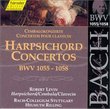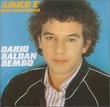Stunning songs, superbly performed
01/08/2003
(5 out of 5 stars)
"This is a splendid rendering all around. The compositions are fantastic, and Philip Langridge has the exquisite instrument to perform these movingly.
Here some notes on the work cribbed from the All Classical Guide:
This song cycle for piano and tenor voice is one of the largest and most profound of Benjamin Britten's many vocal publications, and one of the most distinguished of the twentieth century.
It is the third major song cycle he composed specifically for the voice of Peter Pears, his life partner. Although Britten and Pears had been reading Donne as early as two years earlier, serious work on the cycle was triggered by a specific occasion for performance, Pears and Britten planned a Purcell commemorative concert set for November 1945 at Wigmore Hall. Britten decided to write a cycle in the spirit of Purcell's Divine Hymns to include on the program.
But it is another experience, a particular recital, that impelled the emotional depth of this cycle. Almost as soon as the war ended in Europe, Yehudi Menuhin began touring Europe. Britten joined him for concerts in Germany, which included a performance on July 27 for survivors of the Belsen Concentration Camp.
The cycle begins with "O my blacke Soule," to a stark, hammering piano accompaniment and a vocal setting that emphasizes Donne's rhythmic patterns. "Batter my heart" is a demonic perpetual motion piece at high speed, calling for utmost flexibility, range, and power on the part of the tenor.
A stunned quietness rules the third song, "O might these sighes and teares." The traditional musical representation of a sigh, the interval of the falling second, dominates this song, and from this point the half-step relationship is the most important structural element of the cycle.
"Oh, to vex me" is another moto perpetuo in the piano part, although the line of the voice part is more broken. It ends with a literal shaking in the singer's voice to illustrate the words.
The fifth song, "What if this present" asks the unsettling question, what if this were the earth's last night? Would Christ's crucifixion be in vain as far as the poet's soul is concerned? The tormented answer is "No." This song, the central point in the cycle, is also its darkest moment.
More peaceful, calmly oscillating piano chords begin a path to redemption in "Since she whom I lov'd." Since she is now in heaven, the poet is thinking "wholly on heavenly things."
The seventh song, "At the round earths imagin'd corners," expresses certainty in resurrection and judgment and prays to be taught true repentance. The piano accompaniment has a remarkable ringing effect.
This prayer is continued in "Thou has made me"; the poet begs for grace more for God's sake (lest His work of creation be in vain) than the poet's own. The music is again rushing and agitated, but now this seems directed towards resolution rather than despair, which is found in the final song, the famous "Death be not proud," for "One short sleepe past. Wee wake eternally, And death shall be no more; Death, thou shalt die." The music has an assured, regular tread as the it becomes a lullaby welcoming this final rest. -- Joseph Stevenson"


 Track Listings (26) - Disc #1
Track Listings (26) - Disc #1

